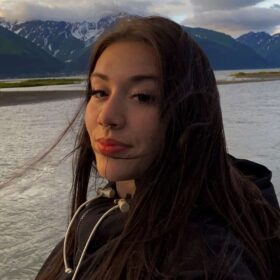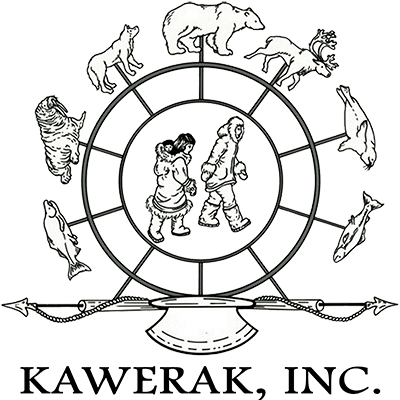What drew you to the Caleb Scholars Program?
I was determined to apply for the Caleb Scholars Program because it explores ways of Inuit-led
conservation and advocacy while empowering and facilitating growth amongst students that can
contribute to the sustainability of Inuit ways of being. I believe that by networking and building
relationality with the CSB board and other students, we can continue to create places to promote
ideas for growth and change while addressing disparities and inequities amongst our people,
land, animals, and water. It is exciting to gain new experience and knowledge that can help me
explore ways to preserve our traditional way of life while prioritizing the health and well-being
of Alaska Native communities.
What does Inuit-led environmental conservation mean to you?
Inuit-led environmental conservation promotes the sovereignty and stewardship of Inuit
communities while applying and integrating traditional worldviews, knowledge, and lived
experiences into decision-making processes that directly impact our livelihoods. I believe it
represents Inuit values and the refusal to solely adhere to dominant ways of conserving and
stewarding our land, water, animals, and people while also developing new ways of contributing
back to our societies. Inuit-led environmental conservation can also mean prioritizing Inuit
worldviews, epistemologies, and voices by sharing stories and exemplifying traditional moral
teachings when appropriate. By uplifting Inuit perspectives and centering traditional values, we
can learn and apply different ways of environmental conservation that can aid in addressing
challenges that can compromise the sustainability of Inuit communities.
How do you engage with environmental conservation in school and/or at home?
As a first-generation college student, it is important to me to seek opportunities that aid in
increasing my knowledge in Inuit-led environmental conservation and further build and
strengthen my leadership skills and professional development while staying connected to my
culture and people. More recently, I have been engaging in environmental conservation in school
through my undergraduate research where I explore the relationship between Alaska Native
fishing practices and state of Alaska fisheries management. I aim to help others understand the
depth of the causes and consequences of emerging food security issues in Alaska Native
communities. My research is inspired by the injustice Alaska Natives are facing regarding
environmental and conservation management decisions by the state of Alaska that are negatively
impacting Alaska Native livelihoods. Indigenous research methodologies portray the ability to
research in a way that is not only culturally appropriate but also acknowledging and taking pride
in representing who we are as Inuit people. It is crucial to address barriers that Alaska Natives
face to being involved in the decision-making processes that directly impact their livelihoods to
move toward a future that wholeheartedly prioritizes the health and well-being of Alaska Native
communities. I engage with environmental conservation when I am home by upholding
traditional beliefs and values while hunting, fishing, gathering, and being on the land or water
that has sustained us for millennia.
What are your educational and career goals? How do your goals relate to environmental
conservation?
I have an A.A.S. in Applied Business with a minor in Entrepreneurship and a Certificate in
Tribal Governance from the University of Alaska Fairbanks. This spring 2024, I will be
graduating with my B.A. in Native American and Indigenous Studies from Fort Lewis College
and I plan to continue my education and pursue a Juris Doctorate degree and Master of Arts in
Native American Studies. I would like to pursue law school so that I can explore Alaska Native
issues through an academic and legal lens, learning the ins and outs of higher institutions while
navigating power imbalances. Some goals for my education are to uplift Indigenous voices, seek
ways to implement Indigenous knowledge into environmental conservation and management
decisions, and explore topics for redress where appropriate within the relationship between the
United States government and Alaska Native sovereign tribes. I aim to explore topics or
solutions that will prioritize the sovereignty of Alaska Native villages and I see myself working
through law to do that. I hope to continue to advocate to protect Inuit lifeways in ways I have yet
to determine.
Please share a reflection when you have felt a connection to the ocean or land.
I feel deeply connected to my people, land, water, and culture when I am out picking berries,
cooking a meal for moose hunters at camp, putting meat away in the fall, plucking geese in the
spring, beading, and more. I was raised by my great-grandma and she instilled in me traditional
beliefs, values, and practices that have shaped my entire being and worldview. These connections
to my culture and people allow me to walk in this life knowing which world grounds me. Even
with being far from home attending college in Colorado, I find ways to feel connected by sharing
meals with my Alaska Native friends, attending Native-led events in Colorado and New Mexico,
and always reminding myself of who I am, where I come from, and why I am here doing this
work.
Do you have a personal story about meeting Caleb, a connection to his legacy and
impact, or are you a family relation?
I am inspired by Caleb’s commitment to strengthening Alaska Native stewardship through
environmental conservation and subsistence efforts. His legacy is powerful. I am honored to be a
part of this program and I look forward to building relationships based on respect and common
values for wanting to uplift the enabling of Inuit to steward our ways of life.

